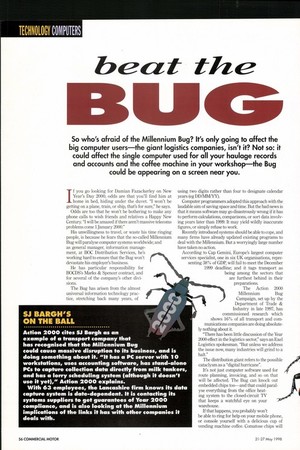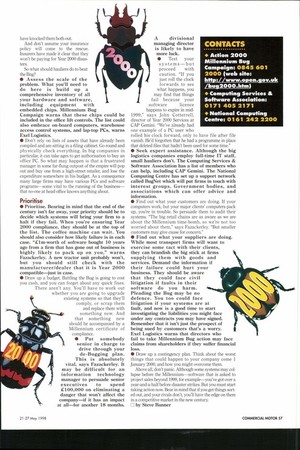beat the
Page 56

Page 57

If you've noticed an error in this article please click here to report it so we can fix it.
So who's afraid of the Millennium Bug? It's only going to affect the big computer users—the giant logistics companies, isn't it? Not so: it could affect the single computer used for all your haulage records and accounts and the coffee machine in your workshop—the Bug could be appearing on a screen near you.
If you go looking for Damian Fazackerley on New Year's Day 2000, odds are that you'll find him at home in bed, hiding under the duvet. "I won't be getting on a plane, train, or ship, that's for sure," he says.
Odds are too that he won't be bothering to make any phone calls to wish friends and relatives a Happy New Century "I will be amazed if there aren't massive telecoms problems come 1 January 2000."
His unwillingness to travel, or waste his time ringing people, is because he fears that the so-called Millennium Bug will paralyse computer systems worldwide; and as general manager, information manage ment, at BOC Distribution Services, he's working hard to ensure that the Bug won't devastate his employer's business.
He has particular responsibility for BOCDS's Marks & Spencer contract, and for several of the company's other divisions.
The Bug has arisen from the almost universal information technology practice, stretching back many years, of using two digits rather than four to designate calendar years (eg DD/MM/YY).
Computer programmers adopted this approach with the laudable aim of saving space and time. But the bad news is that it means software may go disastrously wrong if it has to perform calculations, comparisons, or sort data involving years later than 1999. It may yield wildly inaccurate figures, or simply refuse to work.
Recently introduced systems should be able to cope, and many firms have already updated existing programs to deal with the Millennium. But a worryingly large number have taken no action.
According to Cap Gemini, Europe's largest computer services specialist, one in six UK organisations, representing 38% of GDP, will fail to meet the December 1999 deadline; and it tags transport as being among the sectors that are furthest behind in their preparations.
The Action 2000 Millennium Bug Campaign, set up by the Department of Trade & Industry in late 1997, has commissioned research which shows 16% of all transport and communications companies are doing absolutely nothing about it.
"There has been little discussion of the Year 2000 effect in the logistics sector," says an Exel Logistics spokesman. "But unless we address the issue now, many industries will grind to a halt" The distribution giant refers to the possible cataclysm as a "digital hurricane".
It's not just computer software used for route planning, invoicing, and so on that will be affected. The Bug can knock out embedded chips too—and that could paralyse everything from the office heat ing system to the closed-circuit TV that keeps a watchful eye on your warehouse.
If that happens, you probably won't be able to ring for help on your mobile phone, or console yourself with a delicious cup of vending machine coffee. Comatose chips will have knocked them both out And don't assume your insurance policy will come to the rescue. Insurers have made it clear that they won't be paying for Year 2000 disasters.
So what should hauliers do to beat the Bug?
• Assess the scale of the problem. What you'll need to do here is build up a comprehensive inventory of all your hardware and software, including equipment with embedded chips. Millennium Bug Campaign warns that these chips could be included in the office lift controls. The list could also embrace on-board computers, warehouse access control systems, and lap-top PCs, warns Exel Logistics.
• Don't rely on lists of assets that have already been compiled and are sitting in a .filing cabinet. Go round and physically check everything. In big companies in particular, it can take ages to get authorisation to buy an office PC. So what may happen is that a frustrated manager in some far-flung outpost of the empire will pop out and buy one from a high-street retailer, and lose the expenditure somewhere in his budget. As a consequence many large firms may have various PCs and software programs—some vital to the running of the business— that no-one at head office knows anything about.
Prioritise • Prioritise. Bearing in mind that the end of the century isn't far away, your priority should be to decide which systems will bring your firm to a halt if they fail. When you're ensuring Year 2000 compliance, they should be at the top of the list. The coffee machine can wait. You should also consider how likely failure is in each case. "£1m-worth of software bought 10 years ago from a firm that has gone out of business is highly likely to pack up on you," warns Fazackerley. A new tractor unit probably won't, but you should still check with the manufacturer/dealer that it is Year 2000 compatible—just in case.
• Put somebody senior in charge to drive through your de-Bugging plan. This is absolutely vital, says Fazackerley. It may be difficult for an information technology manager to persuade senior executives to spend £100,000 on eliminating a danger that won't affect the company—if it has an impact at all—for another 18 months. A divisional managing director is likely to have more luck.
• Test your systems—but proceed with caution. "If you just roll the clock forwards to see what happens, you may find that things fail because your • Seek expert assistance. Although the big logistics companies employ full-time IT staff, small hauliers don't. The Computing Services & Software Association has a list of members who can help, including CAP Gemini. The National Computing Centre has set up a support network called BugNet which will put firms in touch with interest groups, Government bodies, and associations which can offer advice and information.
• Find out what your customers are doing. If your computers work, but your major clients' computers pack up, you're in trouble. So persuade them to audit their systems. "The big retail chains are as aware as we are about the Millennium time-bomb, so we're not too worried about them," says Fazackerley. "But smaller customers may give cause for concern."
• Draw up a contingency plan. Think about the worst things that could happen to your company come 1 January 2000, and how you might overcome them.
Above all, don't panic. Although some systems may collapse before the Millennium—software that is asked to project sales beyond 1999, for example—you've got over a year-and-a-half before disaster strikes. But you must start taking action now. Bear in mind that if you get things sorted out, and your rivals don't, you'll have the edge on them in a competitive market in the new century.
by Steve Banner CONTACTS 9. Action 2000 Millennium Bug Campaign: 0845 601 2000 (web site: http://www.open.gov.uk ibug2000.htm) Computing Services & Software Association: 0171 405 2171 National Computing Centre: 0161 242 2200






















































































































